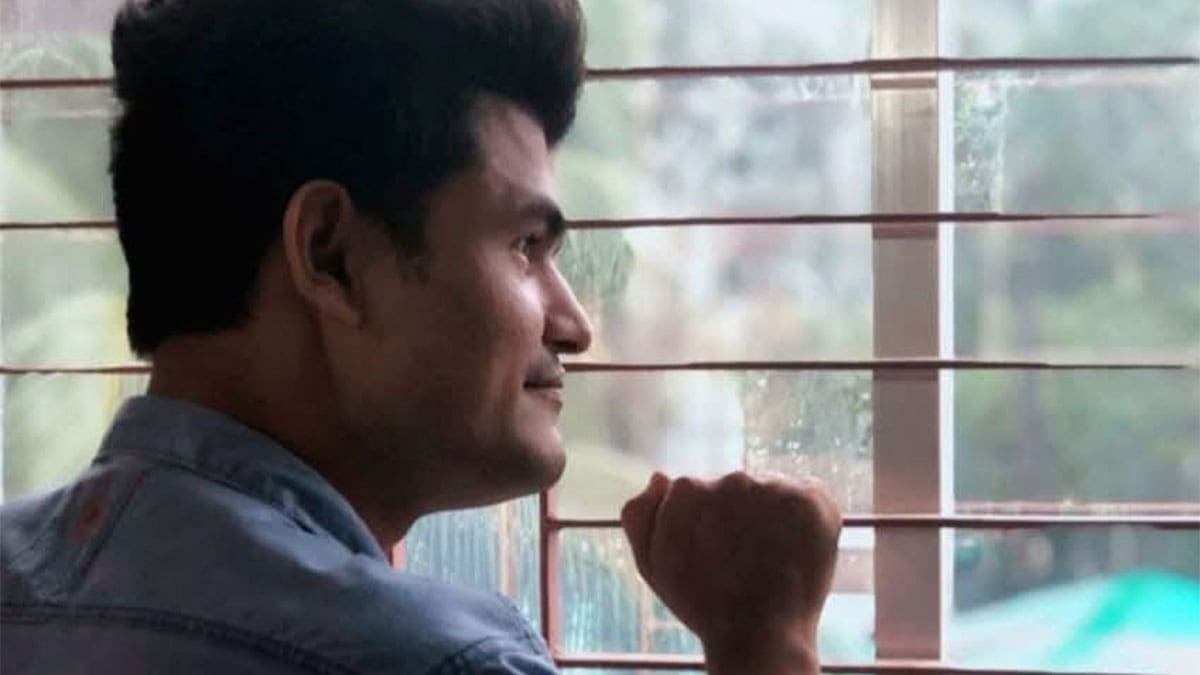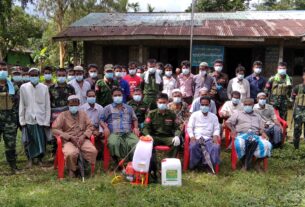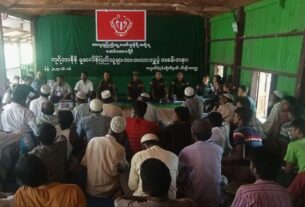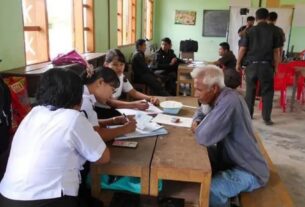May 6 marked the final day of Rohingya human rights defender Mohammad Arfat’s arbitrary detention in Indian jails. After more than four years behind bars, he was taken to the Bangladesh border and deported under the cover of darkness along with two other Bangladeshi migrants.
“Don’t come back. We will shoot you directly,” warned an Indian official escorting him from the Matia detention facility in Assam, now renamed the ‘transit camp’. Arfat was blindfolded during the journey.
He then spent ten days in a Bangladeshi jail while authorities decided what to do with him. As uncertainty mounted, he was overwhelmed by painful memories from his past.
“I felt like taking my life,” Arfat told Maktoob from an undisclosed location in Bangladesh, where his prior activism had attracted death threats.
“I am tired of being persecuted.”
India’s forced deportation of Arfat, with no due process, came nearly two months after the UN Human Rights Council Working Group on Arbitrary Detention urged the Indian government to end Arfat’s detention. The UN recommended his immediate and unconditional release and asked India to coordinate with the UNHCR to grant him protection, including possible resettlement in a third country.
The Working Group also expressed grave concern that Arfat was experiencing suicidal thoughts after years of detention and required urgent medical care.
Since early May, India has expelled nearly 600 undocumented individuals it deems “illegal migrants”. Most were deported at land borders with Bangladesh, but 40 Rohingyas holding UNHCR cards were allegedly pushed into the Andaman Sea near the Myanmar border.
India, which is not a signatory to the 1951 Refugee Convention or its 1967 Protocol, classifies Rohingya refugees as illegal immigrants under laws such as the Foreigners Act of 1946. This legal position has led to arbitrary detention and deportation, even for those registered with the United Nations High Commissioner for Refugees (UNHCR).
Although Arfat is now reunited with his wife and young children—a comfort after nearly five years—he struggles to rebuild his life. Genocide in Myanmar, persecution in India, and death threats in Bangladesh have left him “mentally and physically exhausted”.
“To Be a Hero Like My Father”
Arfat’s life has been shaped by the violence and persecution faced by the Rohingya. In 1993, when he was just an infant, his father, Mohammadul Hassan—a community leader in Ye Nauck Nga Tha village in Rakhine State—was allegedly killed by Myanmar forces in a police station.
“I wanted to be like my father,” Arfat said. Although he has no personal memories of him, Arfat chose community service as a way to honour his father’s legacy. Amid systemic discrimination in education, he was considered “lucky one” to be among the few Rohingyas who could study.
By 2012, while preparing for his high school graduation exams at age 17, violence in Rakhine State forced schools to close, and thousands of Rohingyas were displaced into camps. Arfat, who had been offering free tutoring to other students, began attracting the attention of authorities. As restrictions against Rohingyas intensified, his mother urged him to leave for his safety.
In July 2012, Arfat fled to Bangladesh and later moved to India’s Jammu region.
“While in India, Arfat worked as a translator and community mobilizer with the Development and Justice Initiative, an NGO partnered with UNHCR,” human rights group Fortify Rights wrote in a submission to the UN.
When the organisation shut down in 2018, Arfat struggled to find work. The Indian government began requesting documents from Myanmar and biometric data, which he feared would compromise his safety. Hoping for better opportunities and increased security, he returned to Bangladesh.
“Hatred was fuming,” he said of his experience in Jammu.
He returned to Bangladesh to help his mother and other relatives who were fleeing the Myanmar military’s 2017 campaign of mass atrocities against the Rohingya. Thousands were killed, and over 700,000 fled to Bangladesh in what the UN called a “textbook example of ethnic cleansing.”
In Bangladesh, Arfat worked with the Centre for Peace and Justice from May to October 2019. But rising crime in the refugee camps again made him feel unsafe. He got married in the camp and now has two children.
Arfat became increasingly vocal about the human trafficking crisis in the camps. According to the submission to the UN, militant groups began threatening him. In both October 2019 and August 2020, he refused requests to collaborate with such groups, prompting threats that jeopardised his safety.
These threats compelled him to seek safety in India once more, where some of his family still lived.
Arrest and indefinite detention
On December 23, 2020, Arfat was arrested by Assam police while reportedly crossing from Bangladesh into India. As he approached the Naka checkpoint, several Rohingya individuals were detained. Acting as a human rights defender, Arfat attempted to advocate on their behalf.
He was detained, interrogated, and reportedly physically assaulted. When questioned about his choice to come to India rather than seek refuge elsewhere, he presented his UNHCR refugee card and other documents verifying his status.
He explained that he had returned to India, fearing for his life in Bangladesh.
After two or three days in police custody, Arfat was transferred to Karimganj District Prison, where he remained until May 2022. He was denied contact with his family, and his belongings were confiscated.
“They made me sleep next to the toilet,” Arfat said, recalling the inhumane conditions. He faced harassment from inmates due to his Rohingya identity.
After over 500 days in detention, a Karimganj court convicted him in May 2022. He was sentenced to one year in prison and a fine for violating the Foreigners Act, and another year under the Passport (Entry into India) Rules 1950—both sentences served concurrently and considered fulfilled based on time already served.
Despite completing his sentence, Arfat was transferred to Silchar Central Jail and later to the Goalpara Matia Detention Centre in March 2023, where he joined dozens of other Rohingyas awaiting deportation.
India’s Foreigners Act of 1946 allows indefinite detention of individuals identified as “foreigners.” Although Arfat’s family petitioned the Guwahati High Court for his release, the government argued that detention was necessary until Myanmar verified his nationality—a problematic expectation, given the Rohingyas’ stateless status.
The UN Working Group concluded that India had no valid legal grounds under domestic or international law to detain Arfat at any time. The relevant Indian legislation either exceeded international legal limits or was no longer applicable.
“Seeking asylum is a universal human right, the exercise of which must not be criminalised,” the Working Group declared in March 2025.
“They wanted to destroy me,” said Arfat, now 31. During his detention, his wife was pressured to remarry. The family lost their shelter and had to move in with relatives due to security and financial concerns. His children, aged seven and nine, are not enrolled in school—an emotional burden for Arfat, who always valued education.
“I don’t know what to do,” he said in a grim voice over the phone. “I have been troubled despite being a human rights defender. Why am I not getting support from the UN?”
John Quinley, director at Fortify Rights, told Maktoob that the UN Working Group ruling did not recommend forcing Mohammad Arfat to Myanmar or Bangladesh. He fled both countries for security concerns.
“UN ruling called on Indian authorities to provide Mohammad Arfat with reparations, prevent future violations, and cooperate with the UN Refugee Agency to ensure his protection and potential resettlement to a third country.”
“The returns of refugees we documented involved coercion, abuse, and clear violations of international law—amounting to refoulement in some cases to both Myanmar and Bangladesh. India must immediately end its policy of forcibly returning refugees to places of danger and instead uphold its obligations to protect them, including by working with the U.N. Refugee Agency to ensure their safety and rights,” Quinley added.




